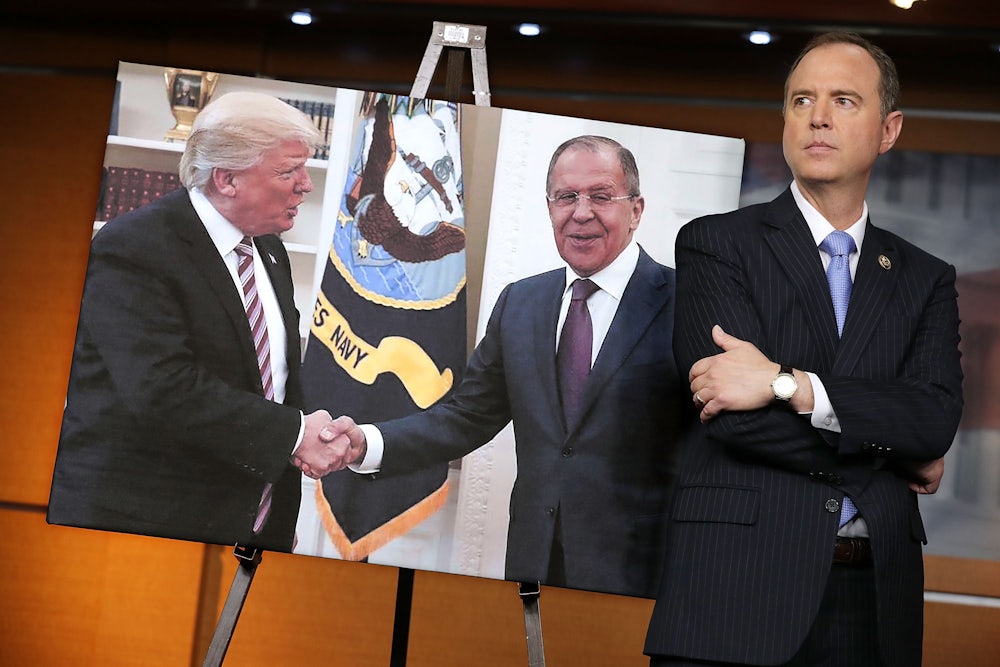For nearly two years, Democrats desperately hoped that Robert Mueller would ride in on a white horse and save the country from Donald Trump’s corrupt presidency. But three days after the special counsel submitted his report to the Department of Justice, one thing is clear: The Russia investigation no longer poses a mortal threat to this presidency. Trump’s future is now in the hands of a divided, hyper-partisan Congress that agrees on almost nothing.
Dejected Democrats may be tempted to keep fighting the administration over the Trump campaign’s connections to Russia and the question of whether he obstructed justice. They are expected to increase pressure on Attorney General William Barr to release not only Mueller’s full report, but all of the documents that informed it, and may even try to assume the mantle of the now-concluded Russia investigation. “There’s a difference between compelling evidence of collusion and whether the special counsel concludes that he can prove beyond a reasonable doubt the criminal charge of conspiracy,” Representative Adam Schiff, the chairman of the House Intelligence Committee, said on Sunday.
It’s time for Democrats to quit their Russia obsession. Prolonging this investigation would be a grave political mistake and distract from more pressing—and more politically potent—inquiries into the president and his administration. It risks becoming a fool’s errand on par with the Republicans’ Benghazi boondoggle.
This comparison is likely to upset some on the political left, who would rightly contend that there are important differences between the Russia and Benghazi investigations. The latter was a largely manufactured scandal, an attempt to soil Barack Obama’s relatively clean administration and rile up the Republican base; it ultimately morphed into a genuine witch hunt aimed at discrediting Hillary Clinton before her presidential campaign got off the ground. This is in marked contrast to Mueller’s dutiful, apolitical investigation, which has produced 37 indictments and resulted in the conviction of Trump’s personal lawyer and his former campaign chairman, as well as a host of other figures with intimate connections to the president.
It’s worth also taking a step back to remember why the Mueller investigation took on such importance among Democrats. Some of it, to be sure, came from its nonpartisan appearance: Here was a strident G-man and lifelong Republican who even the most craven members of the GOP would have to respect. And the discretion of Mueller’s team, from which information rarely leaked, led to wild speculation about what it might know that the press and public did not. But much of the investigation’s allure came from the fact that, with Democrats completely out of power in Washington, the special counsel was the only person investigating Trump for the first two years of his presidency.
The investigation was enormously damaging to the president, but Barr’s letter to Congress on Sunday will serve—undeservedly—as a paper shield for Trump and his defenders. According to Barr, Mueller did not find evidence that the Trump campaign colluded with Russian agents to interfere in the 2016 election, and could not make a determination on obstruction of justice. Considering the scope of the investigation—and its nonpartisan status—it’s highly unlikely that Democrats in Congress will unearth less ambiguous proof on either front.
Given the expectations surrounding Mueller’s investigation—which were inflated partly due to irresponsible media coverage, and partly due to the indictments the investigation continually produced—Democrats undoubtedly are disappointed that it didn’t yield a more decisive conclusion. But the end of the investigation is opportunity to pivot to the more substantial case against Trump.
The Republicans needed the Benghazi investigation, politically speaking, because they didn’t have anything else on Obama or Clinton. The fishing expedition worked: It uncovered Clinton’s use of a private email server while she was secretary of state, which ultimately caused serious and unwarranted political damage. But there’s no need to manufacture a scandal against Trump, given how many are sitting in plain sight.
His presidency has been marred by corruption, some of it taking place in the open at the president’s private club. His shady private businesses face allegations ranging from bank fraud to money laundering. His children are nakedly capitalizing on his presidency, and his son-in-law was mysteriously given a top secret security clearance even though his application was rejected. There are credible accusations of sexual harassment and assault against Trump that go back years. We still haven’t seen his tax returns!
Democrats took back the House in a landslide midterm election by focusing on health care, not Trump’s plan to build a tower in Moscow. The party’s 2020 frontrunners are focusing on issues like climate change and income inequality, not questions about what really happened during a 2016 meeting between the president’s son and a group of Russians. When the attention of presidential aspirants does turn to the president, it revolves around his obvious corruption and his coddling of authoritarians around the world.
Trump can claim that Mueller exonerated him, even if that isn’t quite true. But he hasn’t been, and won’t be, cleared on a host of other charges. As long as Democrats focus on those—and stop getting distracted by shiny objects like collusion, obstruction of justice, or impeachment—they can do what they’d always hoped Mueller would: bring the president to his knees.
